我们有一个类加载方式,能通过SPI机制加载类,但类加载失败了
[TOC]
背景
InfoCenter简述
InfoCenter 是一个依赖 qmq、qconfig,基于本地缓存实现公共配置数据查询服务的Jar包,由一个配置加载模块与多个配置插件组成,能让万量级配置数据的变更于多个业务系统间秒级生效。
以汇率数据配置为例,当汇率数据配置发生变更或业务系统启动时,配置加载模块通过HTTP请求从服务端加载全量汇率数据配置,然后由汇率配置插件解析并保存在本地内存中。业务系统通过调用汇率配置插件的静态方法来快速获取汇率配置。
InfoCenter 有一个懒加载机制,即只有业务系统用到汇率数据配置时才会加载汇率配置插件类。或在业务系统启动时通过白名单配置、历史访问记录等方式提前加载该类。
配置插件的默认实现类通过自定义的SPI集成于 META-INF/spi 目录下,以实现解耦:业务系统可自定义配置插件。
InfoCenter 的SPI实现 参考了 Dubbo 的SPI实现,不同于Java的 ServiceLoader 会遍历SPI配置并实例化所有实现类,InfoCenter和Dubbo的ServiceLoader都可以”按需加载“,从而实现懒加载。
Java的SPI实现参考:Introduction to the Service Provider Interfaces
Dubbo的SPI实现参考:Dubbo SPI
问题描述
某业务系统通过 InfoCenter 查询汇率失败,报错为Jar包中的汇率配置插件类加载失败,异常栈如下:
java.lang.IllegalStateException: No such service com.qunar.flight.qbd.client.rate.logic.IRateLogic by name default
at com.qunar.flight.qbd.framework.kernel.extension.ServiceLoader.findServiceClassLoadException(ServiceLoader.java:368)
at com.qunar.flight.qbd.framework.kernel.extension.ServiceLoader.getServiceClass(ServiceLoader.java:340)
at com.qunar.flight.qbd.framework.kernel.extension.ServiceLoader.get(ServiceLoader.java:464)
at com.qunar.flight.qbd.framework.kernel.extension.ServiceLoader.getDefault(ServiceLoader.java:298)
at com.qunar.flight.qbd.client.rate.RateBeanFactory.getRateLogic(RateBeanFactory.java:79)
at com.qunar.flight.qbd.client.unified.facade.QbdRateFacades.getGdsRate(QbdRateFacades.java:99)
at com.qunar.flight.userproduct.athena.house.core.i18n.service.impl.PriceTranslateServiceImpl.translate(PriceTranslateServiceImpl.java:43)
at com.qunar.flight.userproduct.athena.house.core.i18n.service.impl.replace.strategy.AbstractReplaceStrategy.doReplace(AbstractReplaceStrategy.java:37)
at com.qunar.flight.userproduct.athena.house.core.i18n.service.impl.replace.strategy.DynamicJoinReplaceStrategy.replace(DynamicJoinReplaceStrategy.java:38)
at com.qunar.flight.userproduct.athena.house.core.i18n.service.impl.I18nTranslateServiceImpl.getReplacedVal(I18nTranslateServiceImpl.java:292)
at com.qunar.flight.userproduct.athena.house.core.i18n.service.impl.I18nTranslateServiceImpl.replace(I18nTranslateServiceImpl.java:280)
at com.qunar.flight.userproduct.athena.house.core.i18n.service.impl.I18nTranslateServiceImpl.lambda$parseJsonPath$0(I18nTranslateServiceImpl.java:145)
at java.base/java.util.stream.ForEachOps$ForEachOp$OfRef.accept(ForEachOps.java:183)
at java.base/java.util.ArrayList$ArrayListSpliterator.forEachRemaining(ArrayList.java:1625)
at java.base/java.util.stream.AbstractPipeline.copyInto(AbstractPipeline.java:509)
at java.base/java.util.stream.ForEachOps$ForEachTask.compute(ForEachOps.java:290)
at java.base/java.util.concurrent.CountedCompleter.exec(CountedCompleter.java:754)
at java.base/java.util.concurrent.ForkJoinTask.doExec(ForkJoinTask.java:373)
at java.base/java.util.concurrent.ForkJoinPool$WorkQueue.topLevelExec(ForkJoinPool.java:1182)
at java.base/java.util.concurrent.ForkJoinPool.scan(ForkJoinPool.java:1655)
at java.base/java.util.concurrent.ForkJoinPool.runWorker(ForkJoinPool.java:1622)
at java.base/java.util.concurrent.ForkJoinWorkerThread.run(ForkJoinWorkerThread.java:165)
疑问点
多次验证该问题后,我们整理了以下两个疑问点:
疑问1:其它业务系统、配置插件无法复现此问题
InfoCenter 由一个配置加载模块与多个配置插件组成,所有的配置插件都共用一个配置加载模块。
多次测试其它业务系统、其它配置插件,均无法复现此问题。
疑问2:该业务系统该问题不稳定复现
在该业务系统上进行debug测试:
- 断点阻塞时间较短的情况下,该问题大概率复现。
- 断点阻塞时间较长的情况下,该问题大概率无法复现。
疑问3:出现此问题后,重试也无法重新加载类
debug复现
第一次加载汇率配置类时,判断汇率配置接口的 ServersLoader 实例中nameMapping为空,初始化加载所有实现类。
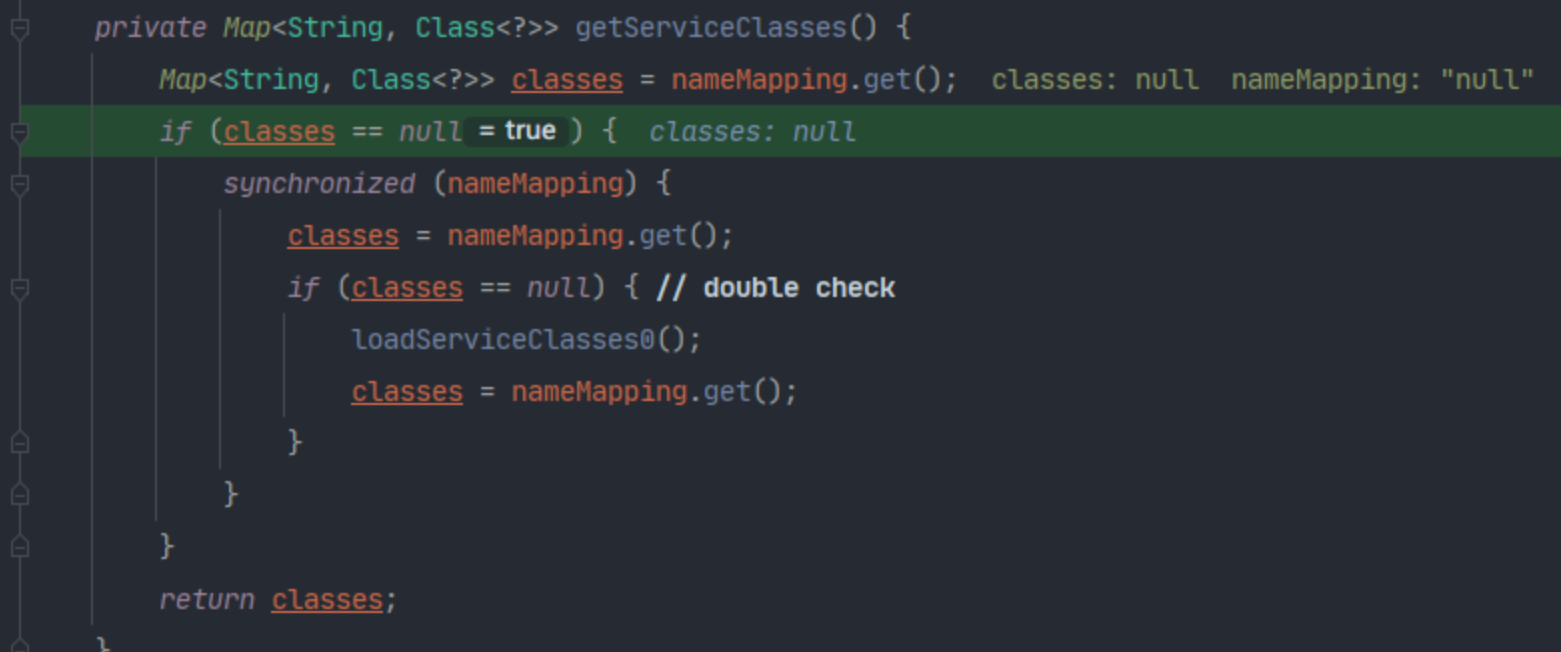
在获取汇率配置接口的默认实现类时,发现getServiceClasses()方法并没有加载该配置接口的所有实现类,包括默认实现类。
导致抛出类加载失败异常。

如下图所示,当前线程的上下文类加载器为null。
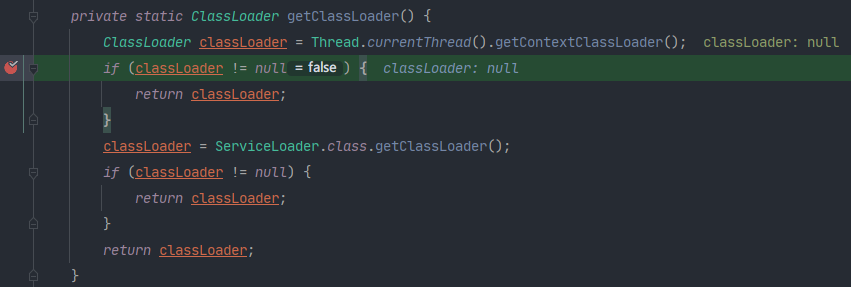
如下图所示,当前线程的线程池为ForkJoinPool,其中的contextClassLoader为null。
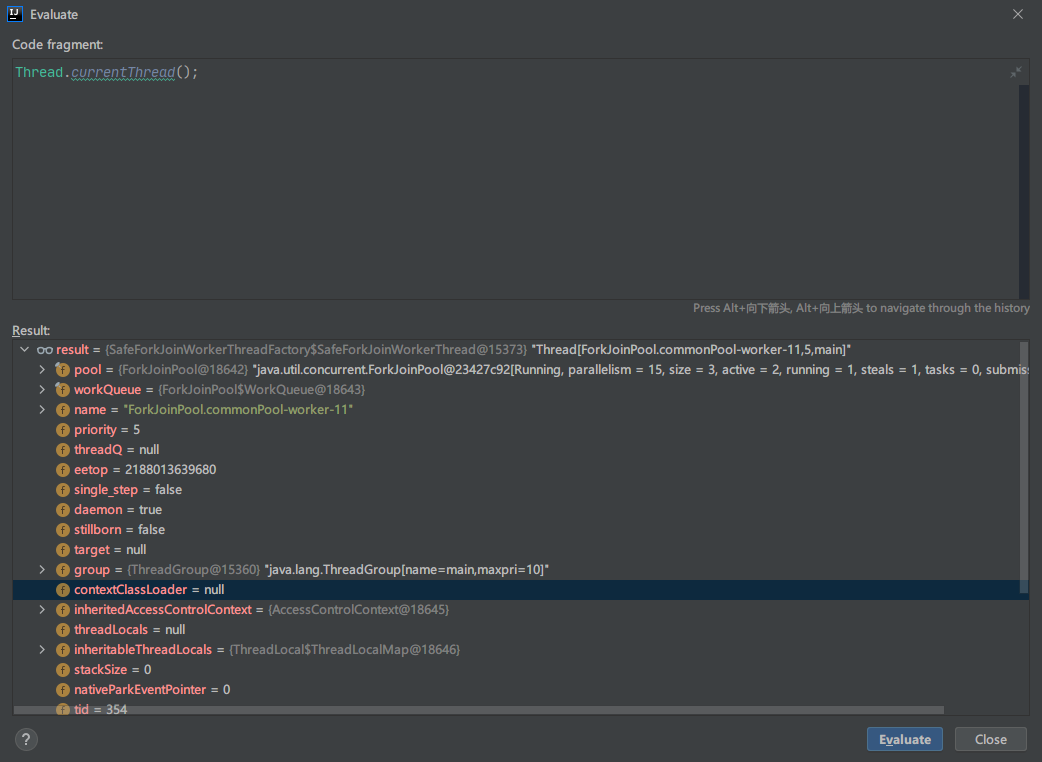
正常情况下,我们拿到的类加载器是 org.apache.catalina.loader.ParallelWebappClassLoader,如下图所示:
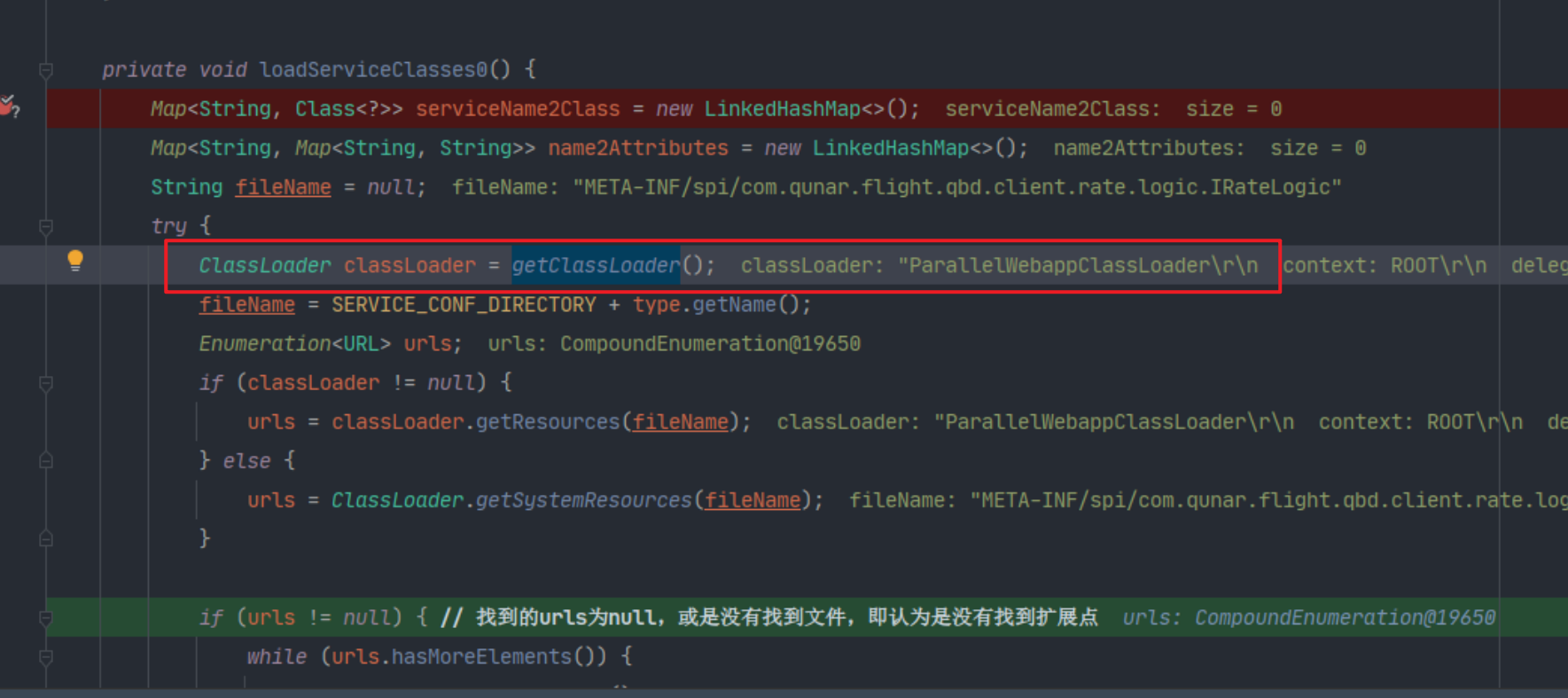
业务代码分析
业务代码调用类加载逻辑的上游,有stream的parallel用法,如下图所示:
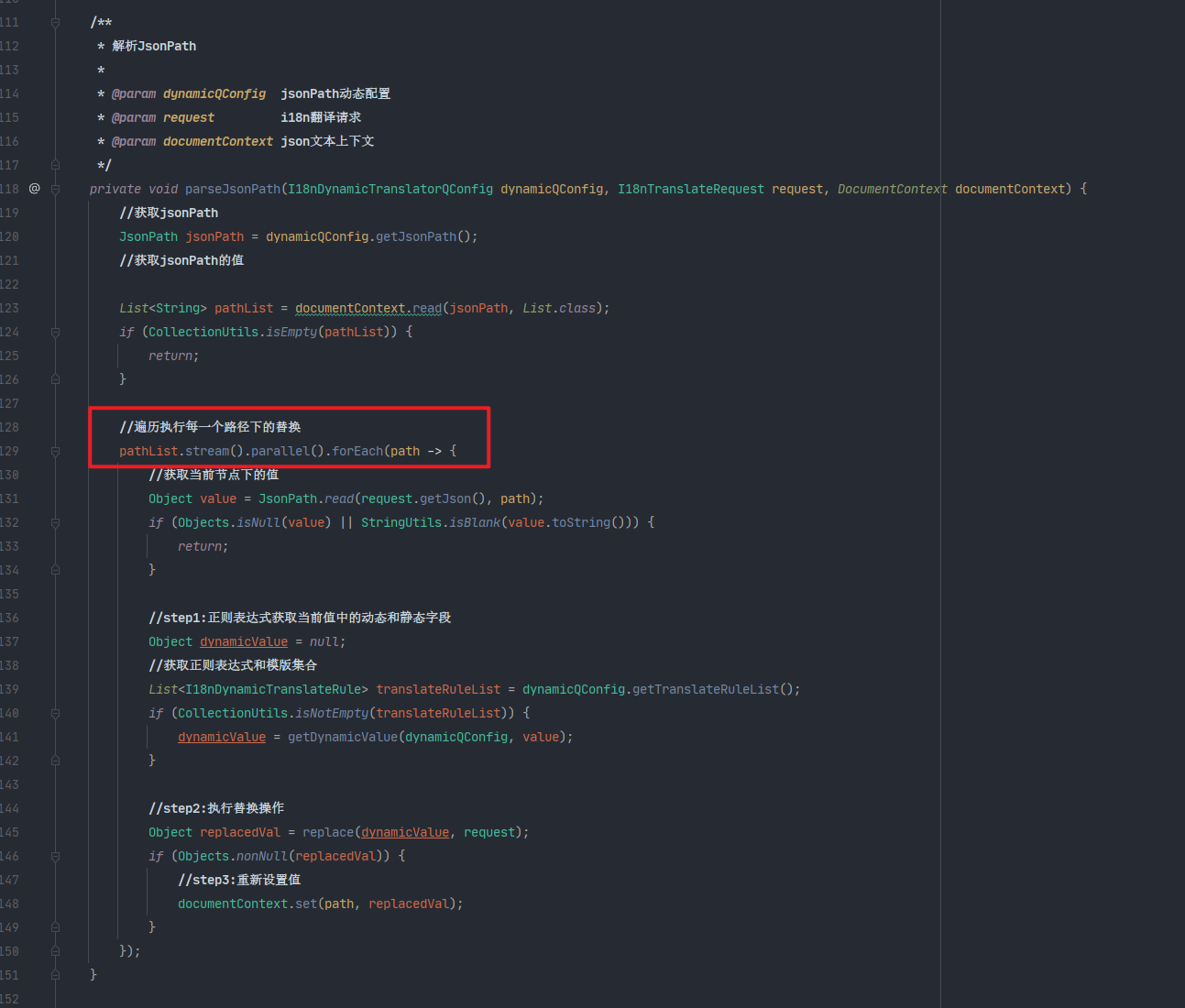
类加载代码分析
业务系统通过下列静态方法获取汇率配置。
此方法先加载汇率配置类,再从该类中获取汇率配置。
public static ExchangeRateVO getGdsRate(String sourceCurrency, String targetCurrency) {
try {
return RateBeanFactory.getRateLogic().getGdsRate(sourceCurrency, targetCurrency);
} catch (Exception e) {
QMonitor.recordOne("qbd_QbdRateFacades_getGdsRate_error");
throw e;
}
}
业务系统通过下列方法获取汇率配置类。
如果该类为空,通过自定义 ServiceLoader 实现加载配置接口的实现类。
private static IRateLogic rateLogic;
public static IRateLogic getRateLogic() {
if (rateLogic == null) {
rateLogic = ServiceLoader.load(IRateLogic.class).getDefault();
}
return rateLogic;
}
业务系统通过下列load()工厂方法加载 ServiceLoader 实例。
自定义 ServiceLoader 中维护了一个 SERVICE_LOADERS map,每个配置接口都有对应的 ServiceLoader 实例。
当某个接口没有 ServiceLoader 实例时,会在map中新增一个 new ServiceLoader<>(type)。
private static final ConcurrentMap<Class<?>, ServiceLoader<?>> SERVICE_LOADERS = new ConcurrentHashMap<>();
/**
* {@link ServiceLoader}的工厂方法。
*
* @param type 扩展点接口类型
* @param <T> 扩展点类型
* @return {@link ServiceLoader}实例
* @throws IllegalArgumentException 参数为<code>null</code>;或是扩展点接口上没有{@link SPI}注解。
*/
public static <T> ServiceLoader<T> load(Class<T> type) {
if (type == null) {
throw new IllegalArgumentException("Service type == null");
}
if (!type.isInterface()) {
throw new IllegalArgumentException("Service type(" + type + ") is not interface!");
}
if (!withSPIAnnotation(type)) {
throw new IllegalArgumentException("Service type(" + type + ") is not service, because WITHOUT @" +
SPI.class.getSimpleName() + " Annotation!");
}
ServiceLoader<T> loader = (ServiceLoader<T>) SERVICE_LOADERS.get(type);
if (loader == null) {
SERVICE_LOADERS.putIfAbsent(type, new ServiceLoader<>(type));
loader = (ServiceLoader<T>) SERVICE_LOADERS.get(type);
}
return loader;
}
ServiceLoader 的构造方法如下。
先解析接口SPI注解的default作为该接口默认实现名,再通过getAdaptive()方法加载该接口的工厂类。
private final IServiceFactory objectFactory;
private ServiceLoader(Class<T> type) {
this.type = type;
String defaultName = null;
final SPI annotation = type.getAnnotation(SPI.class);
if (annotation != null) {
String value = annotation.value();
if ((value = value.trim()).length() > 0) {
String[] names = NAME_SEPARATOR.split(value);
if (names.length > 1) {
throw new IllegalStateException("more than 1 default service name on service " + type.getName() +
": " + Arrays.toString(names));
}
if (names.length == 1 && names[0].trim().length() > 0) {
defaultName = names[0].trim();
}
if (!isValidServiceName(defaultName)) {
throw new IllegalStateException("default name(" + defaultName + ") of service " + type.getName() +
" is invalid!");
}
}
}
this.defaultName = defaultName;
objectFactory = (type == IServiceFactory.class ? null : ServiceLoader.load(IServiceFactory.class).getAdaptive());
}
getAdaptive()方法如下所示。
通过getServiceClasses()方法加载该接口配置的所有实现类。
/**
* 取得Adaptive实例。
*/
public T getAdaptive() {
getServiceClasses(); // 加载扩展点,保证会发现手写的AdaptiveClass
...
}
getServiceClasses()方法如下所示,getServiceClass(String name) 方法可按name获取对应实现类。
通过loadServiceClasses0()方法加载该接口配置的所有实现类,并维护在nameMapping中。
private final AtomicReference<Map<String, Class<?>>> nameMapping = new AtomicReference<>();
private Map<String, Class<?>> getServiceClasses() {
Map<String, Class<?>> classes = nameMapping.get();
if (classes == null) {
synchronized (nameMapping) {
classes = nameMapping.get();
if (classes == null) { // double check
loadServiceClasses0();
classes = nameMapping.get();
}
}
}
return classes;
}
private Class<?> getServiceClass(String name) {
if (name == null) {
throw new IllegalArgumentException("Service name == null");
}
Class<?> clazz = getServiceClasses().get(name);
if (clazz == null) {
throw findServiceClassLoadException(name);
}
return clazz;
}
loadServiceClasses0()方法如下所示。
通过getClassLoader()方法获取类加载器,通过类加载器的getResources()方法和接口全路径名获取SPI配置。
private void loadServiceClasses0() {
Map<String, Class<?>> serviceName2Class = new LinkedHashMap<>();
Map<String, Map<String, String>> name2Attributes = new LinkedHashMap<>();
String fileName = null;
try {
ClassLoader classLoader = getClassLoader();
fileName = SERVICE_CONF_DIRECTORY + type.getName();
Enumeration<URL> urls;
if (classLoader != null) {
urls = classLoader.getResources(fileName);
} else {
urls = ClassLoader.getSystemResources(fileName);
}
if (urls != null) { // 找到的urls为null,或是没有找到文件,即认为是没有找到扩展点
while (urls.hasMoreElements()) {
URL url = urls.nextElement();
readService0(serviceName2Class, name2Attributes, classLoader, url);
}
}
} catch (Throwable t) {
logger.error("Exception when load service point(interface: " + type.getName() + ", description file: " +
fileName + ").", t);
}
nameMapping.set(serviceName2Class);
this.nameAttributesMapping = name2Attributes;
}
getClassLoader()方法如下所示。
先获取当前线程的上下文类加载器,如果为空则返回 ServiceLoader类的类加载器。
private static ClassLoader getClassLoader() {
ClassLoader classLoader = Thread.currentThread().getContextClassLoader();
if (classLoader != null) {
return classLoader;
}
classLoader = ServiceLoader.class.getClassLoader();
if (classLoader != null) {
return classLoader;
}
return classLoader;
}
解决方案
1.业务方谨慎使用stream的parallel,手动指定子线程的类加载器
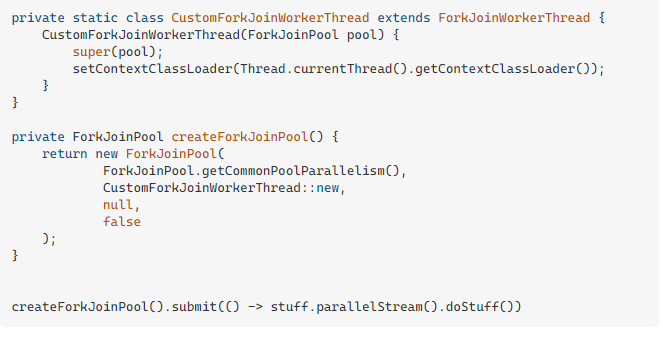
2.InfoCenter优化获取类加载器方式【待定】
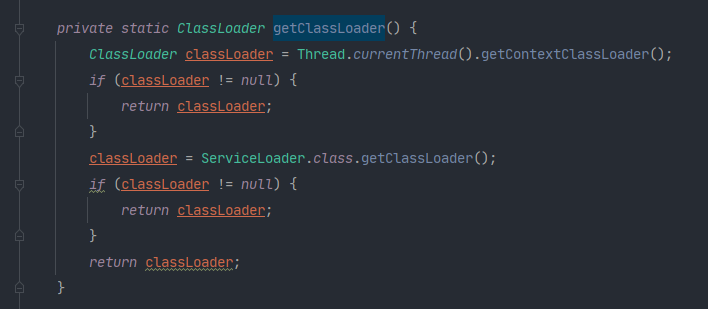
3.InfoCenter优化判断类加载是否成功的逻辑
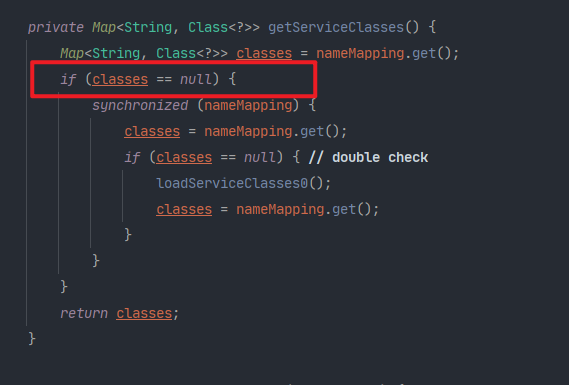
总结可能遇到类加载失败的情况
在Java中,除了parallelStream和CompletableFuture之外,还有几种使用异步线程的方式可能会遇到类加载器相关的问题:
1、ExecutorService: 当你使用ExecutorService(或其子类如ThreadPoolExecutor)来提交任务时,如果没有显式地设置线程的上下文类加载器,那么可能会遇到类加载器问题。
ExecutorService executorService = Executors.newFixedThreadPool(10);
executorService.submit(() -> {
// 可能需要设置上下文类加载器
// ...
});
2、Thread: 直接创建一个新的Thread对象时,如果在该线程中加载类或资源,可能需要设置上下文类加载器。
new Thread(() -> {
// 可能需要设置上下文类加载器
// ...
}).start();
3、TimerTask: 使用java.util.Timer类执行定时任务时,也可能需要关注类加载器的问题。
Timer timer = new Timer();
timer.schedule(new TimerTask() {
@Override
public void run() {
// 可能需要设置上下文类加载器
// ...
}
}, delay, period);
4、ForkJoinPool: 如果直接使用ForkJoinPool来执行任务,同样需要注意类加载器的设置。
ForkJoinPool forkJoinPool = new ForkJoinPool();
forkJoinPool.submit(() -> {
// 可能需要设置上下文类加载器
// ...
});
5、ScheduledExecutorService: 使用ScheduledExecutorService来执行周期性任务时,类加载器的问题也需要考虑。
ScheduledExecutorService scheduledExecutorService = Executors.newScheduledThreadPool(1);
scheduledExecutorService.scheduleAtFixedRate(() -> {
// 可能需要设置上下文类加载器
// ...
}, initialDelay, period, TimeUnit.SECONDS);
6、Custom Thread Factory: 如果你使用自定义的线程工厂来创建线程,那么在工厂方法中设置类加载器是一个好习惯。
ExecutorService executorService = Executors.newFixedThreadPool(10, runnable -> {
Thread thread = new Thread(runnable);
thread.setContextClassLoader(contextClassLoader);
return thread;
});
附录
参考示例
- 记使用CompletableFuture时,关于ClassLoader引起的问题
- Parallel stream doesn’t set Thread.contextClassLoader after tomcat upgrade
- Tomcat 应用中并行流带来的类加载问题
- parallelStream和ForkJoinPool的使用风险
完整代码
<details>
<summary>完整代码</summary>
import javax.annotation.PostConstruct;
import javax.annotation.Resource;
import java.io.BufferedReader;
import java.io.InputStreamReader;
import java.io.PrintWriter;
import java.io.StringWriter;
import java.lang.reflect.Constructor;
import java.lang.reflect.Field;
import java.lang.reflect.Method;
import java.lang.reflect.Modifier;
import java.net.URL;
import java.util.ArrayList;
import java.util.Arrays;
import java.util.Collection;
import java.util.Collections;
import java.util.Comparator;
import java.util.Enumeration;
import java.util.HashMap;
import java.util.LinkedHashMap;
import java.util.List;
import java.util.Map;
import java.util.Set;
import java.util.concurrent.ConcurrentHashMap;
import java.util.concurrent.ConcurrentMap;
import java.util.concurrent.CopyOnWriteArraySet;
import java.util.concurrent.atomic.AtomicReference;
import java.util.regex.Pattern;
public class ServiceLoader<T> {
private static final Logger logger = LoggerFactory.getLogger(ServiceLoader.class);
private static final Pattern NAME_SEPARATOR = Pattern.compile("\\s*[,]+\\s*");
private static final Pattern NAME_PATTERN = Pattern.compile("[a-zA-Z0-9_]+");
private static final ConcurrentMap<Class<?>, ServiceLoader<?>> SERVICE_LOADERS = new ConcurrentHashMap<Class<?>, ServiceLoader<?>>();
private static final Comparator<Object> ACTIVATE_COMPARATOR = (o1, o2) -> {
if (o1 == null && o2 == null) {
return 0;
}
if (o1 == null) {
return -1;
}
if (o2 == null) {
return 1;
}
if (o1.equals(o2)) {
return 0;
}
Activate a1 = o1.getClass().getAnnotation(Activate.class);
Activate a2 = o2.getClass().getAnnotation(Activate.class);
if ((a1.before().length > 0 || a1.after().length > 0 || a2.before().length > 0 || a2.after().length > 0)
&& o1.getClass().getInterfaces().length > 0
&& o1.getClass().getInterfaces()[0].isAnnotationPresent(SPI.class)) {
ServiceLoader<?> serviceLoader = ServiceLoader.load(o1.getClass().getInterfaces()[0]);
if (a1.before().length > 0 || a1.after().length > 0) {
String n2 = serviceLoader.getName(o2.getClass());
for (String before : a1.before()) {
if (before.equals(n2)) {
return -1;
}
}
for (String after : a1.after()) {
if (after.equals(n2)) {
return 1;
}
}
}
if (a2.before().length > 0 || a2.after().length > 0) {
String n1 = serviceLoader.getName(o1.getClass());
for (String before : a2.before()) {
if (before.equals(n1)) {
return 1;
}
}
for (String after : a2.after()) {
if (after.equals(n1)) {
return -1;
}
}
}
}
int n1 = a1.order();
int n2 = a2.order();
return n1 > n2 ? 1 : -1; // 就算n1 == n2也不能返回0,否则在HashSet等集合中,会被认为是同一值而覆盖
};
private static final ConcurrentMap<Class<?>, Object> SERVICE_INSTANCES = new ConcurrentHashMap<>();
private static final ConcurrentMap<Class<? extends NameExtractor>, NameExtractor> EXTRACTOR_INSTANCES = new ConcurrentHashMap<>();
private static final String SERVICE_CONF_DIRECTORY = "META-INF/spi/";
private static final String PREFIX_ADAPTIVE_CLASS = "*";
private static final String PREFIX_WRAPPER_CLASS = "+";
private final AtomicReference<Map<String, Class<?>>> nameMapping = new AtomicReference<>();
private final ConcurrentMap<Class<?>, List<String>> serviceProviderClassMapping = new ConcurrentHashMap<>();
private final Class<T> type;
private final String defaultName;
private final IServiceFactory objectFactory;
private final ConcurrentMap<String, AtomicReference<T>> instances = new ConcurrentHashMap<>();
private final ConcurrentMap<String, AtomicReference<Throwable>> createInstanceErrors = new ConcurrentHashMap<>();
private final AtomicReference<T> adaptiveInstance = new AtomicReference<>();
private final AtomicReference<Throwable> createAdaptiveInstanceError = new AtomicReference<>();
private final Map<String, Activate> activatesNames = Collections.synchronizedMap(new LinkedHashMap<>());
private volatile Class<? extends T> adaptiveClass = null;
private Map<String, IllegalStateException> classLoadExceptions = new ConcurrentHashMap<>();
private volatile Map<String, Map<String, String>> nameAttributesMapping;
private volatile Set<Class<? extends T>> wrapperClasses;
private ServiceLoader(Class<T> type) {
this.type = type;
String defaultName = null;
final SPI annotation = type.getAnnotation(SPI.class);
if (annotation != null) {
String value = annotation.value();
if ((value = value.trim()).length() > 0) {
String[] names = NAME_SEPARATOR.split(value);
if (names.length > 1) {
throw new IllegalStateException("more than 1 default service name on service " + type.getName() +
": " + Arrays.toString(names));
}
if (names.length == 1 && names[0].trim().length() > 0) {
defaultName = names[0].trim();
}
if (!isValidServiceName(defaultName)) {
throw new IllegalStateException("default name(" + defaultName + ") of service " + type.getName() +
" is invalid!");
}
}
}
this.defaultName = defaultName;
objectFactory = (type == IServiceFactory.class ? null : ServiceLoader.load(IServiceFactory.class).getAdaptive());
}
/**
* {@link ServiceLoader}的工厂方法。
*
* @param type 扩展点接口类型
* @param <T> 扩展点类型
* @return {@link ServiceLoader}实例
* @throws IllegalArgumentException 参数为<code>null</code>;
* 或是扩展点接口上没有{@link SPI}注解。
*/
@SuppressWarnings("unchecked")
public static <T> ServiceLoader<T> load(Class<T> type) {
if (type == null) {
throw new IllegalArgumentException("Service type == null");
}
if (!type.isInterface()) {
throw new IllegalArgumentException("Service type(" + type + ") is not interface!");
}
if (!withSPIAnnotation(type)) {
throw new IllegalArgumentException("Service type(" + type + ") is not service, because WITHOUT @" +
SPI.class.getSimpleName() + " Annotation!");
}
ServiceLoader<T> loader = (ServiceLoader<T>) SERVICE_LOADERS.get(type);
if (loader == null) {
SERVICE_LOADERS.putIfAbsent(type, new ServiceLoader<>(type));
loader = (ServiceLoader<T>) SERVICE_LOADERS.get(type);
}
return loader;
}
private static <T> boolean withSPIAnnotation(Class<T> type) {
return type.isAnnotationPresent(SPI.class);
}
private static boolean isValidServiceName(String name) {
return NAME_PATTERN.matcher(name).matches();
}
private static ClassLoader getClassLoader() {
ClassLoader classLoader = Thread.currentThread().getContextClassLoader();
if (classLoader != null) {
return classLoader;
}
classLoader = ServiceLoader.class.getClassLoader();
if (classLoader != null) {
return classLoader;
}
return classLoader;
}
private static String toString(Throwable throwable) {
StringWriter w = new StringWriter(1024);
PrintWriter p = new PrintWriter(w);
try {
throwable.printStackTrace(p);
return w.toString();
} finally {
p.close();
}
}
/**
* <code>
* "attrib1=value1,attrib2=value2,isProvider,order=3" =>
* {"attrib1"="value1", "attrib2"="value2", "isProvider"="", "order"="3"}
* </code>
*/
private static Map<String, String> parseServiceAttribute(String attribute) {
Map<String, String> ret = new HashMap<String, String>();
if (attribute == null || attribute.length() == 0) {
return ret;
}
String[] parts = attribute.split(",");
for (String part : parts) {
part = part.trim();
int idx = part.indexOf('=');
if (idx > 0) {
ret.put(part.substring(0, idx).trim(),
part.substring(idx + 1).trim());
} else {
ret.put(part, "");
}
}
return ret;
}
private static boolean isEmpty(String value) {
return value == null || value.length() == 0 || "false".equalsIgnoreCase(value) || "0".equalsIgnoreCase(value)
|| "null".equalsIgnoreCase(value) || "N/A".equalsIgnoreCase(value);
}
/**
* 获取扩展点实现的所有扩展点名。
*/
public Set<String> getNames() {
Map<String, Class<?>> clazzes = getServiceClasses();
return Collections.unmodifiableSet(clazzes.keySet());
}
/**
* 返回缺省的扩展点名,如果没有设置缺省则返回<code>null</code>。
*/
public String getDefaultName() {
return defaultName;
}
/**
* 返回缺省的扩展。
*
* @throws IllegalStateException 指定的扩展没有设置缺省扩展点
*/
public T getDefault() {
if (null == defaultName || defaultName.length() == 0) {
throw new IllegalStateException("No default service on service " + type.getName());
}
return get(defaultName);
}
public T getOrDefault(String name) {
name = (name == null || name.length() == 0) ? defaultName : name;
return get(name);
}
/**
* 检查是否有指定名字的扩展。
*
* @param name 扩展名
* @return 有指定名字的扩展,则<code>true</code>,否则<code>false</code>。
* @throws IllegalArgumentException 参数为<code>null</code>或是空字符串。
*/
public boolean has(String name) {
if (name == null || name.length() == 0) {
throw new IllegalArgumentException("Service name == null");
}
return getServiceClasses().get(name) != null;
}
private Map<String, Class<?>> getServiceClasses() {
Map<String, Class<?>> classes = nameMapping.get();
if (classes == null) {
synchronized (nameMapping) {
classes = nameMapping.get();
if (classes == null) { // double check
loadServiceClasses0();
classes = nameMapping.get();
}
}
}
return classes;
}
private Class<?> getServiceClass(String name) {
if (name == null) {
throw new IllegalArgumentException("Service name == null");
}
Class<?> clazz = getServiceClasses().get(name);
if (clazz == null) {
throw findServiceClassLoadException(name);
}
return clazz;
}
private IllegalStateException findServiceClassLoadException(String name) {
String msg = "No such service " + type.getName() + " by name " + name;
for (Map.Entry<String, IllegalStateException> entry : classLoadExceptions.entrySet()) {
if (entry.getKey().toLowerCase().contains(name.toLowerCase())) {
IllegalStateException e = entry.getValue();
return new IllegalStateException(msg + ", cause: " + e.getMessage(), e);
}
}
StringBuilder buf = new StringBuilder(msg);
if (!classLoadExceptions.isEmpty()) {
buf.append(", possible causes: ");
int i = 1;
for (Map.Entry<String, IllegalStateException> entry : classLoadExceptions.entrySet()) {
buf.append("\r\n(");
buf.append(i++);
buf.append(") ");
buf.append(entry.getKey());
buf.append(":\r\n");
buf.append(toString(entry.getValue()));
}
}
return new IllegalStateException(buf.toString());
}
@SuppressWarnings("unchecked")
private T createService(String name) {
Class<?> clazz = getServiceClass(name);
try {
T instance = (T) SERVICE_INSTANCES.get(clazz);
if (instance == null) {
Constructor<?> constructor = clazz.getDeclaredConstructor();
constructor.setAccessible(true);
SERVICE_INSTANCES.putIfAbsent(clazz, constructor.newInstance());
instance = (T) SERVICE_INSTANCES.get(clazz);
}
initializingService(injectService(instance));
Set<Class<? extends T>> wrapperClasses = this.wrapperClasses;
if (wrapperClasses != null && wrapperClasses.size() > 0) {
for (Class<? extends T> wrapperClass : wrapperClasses) {
Constructor<? extends T> constructor = wrapperClass.getDeclaredConstructor(type);
constructor.setAccessible(true);
instance = initializingService(injectService(constructor.newInstance(instance)));
}
}
return instance;
} catch (Throwable t) {
throw new IllegalStateException("Fail to create service " + name + " of service point " + type.getName() +
", cause: " + t.getMessage(), t);
}
}
private T injectService(T instance) {
if (objectFactory != null) {
for (Field field : instance.getClass().getDeclaredFields()) {
Resource inject = field.getAnnotation(Resource.class);
if (inject != null) {
Class<?> type = inject.type();
String name = inject.name();
if (type == Object.class) {
type = field.getType();
}
try {
Object object = objectFactory.getService(type, name);
if (object != null) {
field.setAccessible(true);
field.set(instance, object);
}
} catch (Exception e) {
// logger.error("Fail to inject via field " + field.getName() + " of interface to service " +
// "implementation " + instance.getClass() + " for service point " + type.getName() +
// ", cause: " + e.getMessage(), e);
throw new RuntimeException("Fail to inject via field " + field.getName() + " of interface to service " +
"implementation " + instance.getClass() + " for service point " + type.getName(), e);
}
}
}
}
return instance;
}
private T initializingService(T instance) {
if (objectFactory != null) {
for (Method method : instance.getClass().getDeclaredMethods()) {
if (method.getAnnotation(PostConstruct.class) != null) {
try {
method.setAccessible(true);
method.invoke(instance);
} catch (Exception e) {
// logger.error("Fail to inject InitMethod method " + method.getName() + " of interface to service " +
// "implementation " + instance.getClass() + " for service point " + type.getName() +
// ", cause: " + e.getMessage(), e);
throw new RuntimeException("Fail to inject InitMethod method " + method.getName() + " of interface to service " +
"implementation " + instance.getClass() + " for service point " + type.getName(), e);
}
}
}
}
return instance;
}
/**
* 获取指定名字的扩展实例。
*
* @param name 扩展名
* @return 指定名字的扩展实例
* @throws IllegalArgumentException 参数为<code>null</code>或是空字符串。
* @throws IllegalStateException 指定的扩展名没有对应的扩展点,异常栈中包含可能的原因。
* @since 0.1.0
*/
public T get(String name) {
if (name == null || name.length() == 0) {
throw new IllegalArgumentException("Service name == null");
}
// 先一下加载扩展点类,如果没有这个名字的扩展点类,会抛异常,
// 这样不用创建不必要的Holder。
getServiceClass(name);
try {
// 引入的Holder是为了下面用Holder作“细粒度锁”,而不是锁整个serviceInstances
AtomicReference<T> holder = instances.get(name);
if (holder == null) {
instances.putIfAbsent(name, new AtomicReference<>());
holder = instances.get(name);
}
AtomicReference<Throwable> throwableHolder = createInstanceErrors.get(name);
if (throwableHolder == null) {
createInstanceErrors.put(name, new AtomicReference<>());
throwableHolder = createInstanceErrors.get(name);
}
if (throwableHolder.get() != null) {
//fix 本次调用抛出异常,删除异常Holder,保证下一次能够继续加载,而不是一直hold住
createInstanceErrors.remove(name);
throw new IllegalStateException("Fail to get service " + name + " of service point " + type.getName() +
", cause: " + throwableHolder.get().getMessage(), throwableHolder.get());
}
if (holder.get() == null) {
synchronized (holder) {
holder = instances.get(name);
throwableHolder = createInstanceErrors.get(name);
if (throwableHolder.get() != null) { // double check
//fix 本次调用抛出异常,删除异常Holder,保证下一次能够继续加载,而不是一直hold住
createInstanceErrors.remove(name);
throw new IllegalStateException("Fail to get service " + name + " of service point " +
type.getName() + ", cause: " + throwableHolder.get().getMessage(), throwableHolder.get());
}
if (holder.get() == null) {
try {
holder.set(createService(name));
} catch (Throwable t) {
throwableHolder.set(t);
throw new IllegalStateException("Fail to get service " + name + " of service point " +
type.getName() + ", cause: " + t.getMessage(), t);
}
}
}
}
return holder.get();
} catch (Exception e) {
//fix 本次调用抛出异常,删除异常Holder,保证下一次能够继续加载,而不是一直hold住
createInstanceErrors.remove(name);
throw e;
}
}
private void loadServiceClasses0() {
Map<String, Class<?>> serviceName2Class = new LinkedHashMap<>();
Map<String, Map<String, String>> name2Attributes = new LinkedHashMap<>();
String fileName = null;
try {
ClassLoader classLoader = getClassLoader();
fileName = SERVICE_CONF_DIRECTORY + type.getName();
Enumeration<URL> urls;
if (classLoader != null) {
urls = classLoader.getResources(fileName);
} else {
urls = ClassLoader.getSystemResources(fileName);
}
if (urls != null) { // 找到的urls为null,或是没有找到文件,即认为是没有找到扩展点
while (urls.hasMoreElements()) {
URL url = urls.nextElement();
readService0(serviceName2Class, name2Attributes, classLoader, url);
}
}
} catch (Throwable t) {
logger.error("Exception when load service point(interface: " + type.getName() + ", description file: " +
fileName + ").", t);
}
nameMapping.set(serviceName2Class);
this.nameAttributesMapping = name2Attributes;
}
private void readService0(Map<String, Class<?>> serviceName2Class, Map<String, Map<String, String>> name2Attributes,
ClassLoader classLoader, URL url) {
BufferedReader reader = null;
try {
reader = new BufferedReader(new InputStreamReader(url.openStream(), "utf-8"));
String line;
while ((line = reader.readLine()) != null) {
String config = line;
// delete comments
final int ci = config.indexOf('#');
if (ci >= 0) {
config = config.substring(0, ci);
}
config = config.trim();
if (config.length() == 0) {
continue;
}
String name = null;
String body = null;
String attribute = null;
try {
int i = config.indexOf('=');
if (i > 0) {
name = config.substring(0, i).trim();
body = config.substring(i + 1).trim();
}
// 没有配置文件中没有扩展点名,从实现类的SPI注解上读取。
if (name == null || name.length() == 0) {
throw new IllegalStateException("missing service name, config value: " + config);
}
int j = config.indexOf("(", i);
if (j > 0) {
if (config.charAt(config.length() - 1) != ')') {
throw new IllegalStateException("missing ')' of service attribute!");
}
body = config.substring(i + 1, j).trim();
attribute = config.substring(j + 1, config.length() - 1);
}
Class<? extends T> clazz = Class.forName(body, true, classLoader).asSubclass(type);
if (!type.isAssignableFrom(clazz)) {
throw new IllegalStateException("Error when load service class(interface: " + type.getName() +
", class line: " + clazz.getName() + "), class " + clazz.getName() +
"is not subtype of interface.");
}
if (name.startsWith(PREFIX_ADAPTIVE_CLASS)) {
if (adaptiveClass == null) {
adaptiveClass = clazz;
} else if (!adaptiveClass.equals(clazz)) {
throw new IllegalStateException("More than 1 adaptive class found: " +
adaptiveClass.getClass().getName() + ", " + clazz.getClass().getName());
}
} else {
boolean isWrapper = name.startsWith(PREFIX_WRAPPER_CLASS);
if (isWrapper) {
try {
clazz.getDeclaredConstructor(type);
Set<Class<? extends T>> wrappers = wrapperClasses;
if (wrappers == null) {
wrapperClasses = new CopyOnWriteArraySet<>();
wrappers = wrapperClasses;
}
wrappers.add(clazz);
} catch (NoSuchMethodException e) {
throw new IllegalStateException("wrapper class(" + clazz + ") has NO copy constructor!", e);
}
} else {
String[] nameList = NAME_SEPARATOR.split(name);
Activate activate = clazz.getAnnotation(Activate.class);
if (activate != null) {
activatesNames.put(nameList[0], activate);
}
for (String n : nameList) {
if (!isValidServiceName(n)) {
throw new IllegalStateException("name(" + n + ") of service " + type.getName() +
"is invalid!");
}
try {
clazz.getDeclaredConstructor();
} catch (NoSuchMethodException e) {
throw new IllegalStateException("service class(" + clazz + ") has NO default " +
"constructor!", e);
}
if (serviceName2Class.containsKey(n)) {
if (serviceName2Class.get(n) != clazz) {
throw new IllegalStateException("Duplicate service " + type.getName() +
" name " + n + " on " + clazz.getName() + " and " + clazz.getName());
}
} else {
serviceName2Class.put(n, clazz);
}
name2Attributes.put(n, parseServiceAttribute(attribute));
List<String> serviceNames = serviceProviderClassMapping.get(clazz);
if (serviceNames == null) {
serviceProviderClassMapping.put(clazz, serviceNames = new ArrayList<>(1));
}
serviceNames.add(n);
}
}
}
} catch (Throwable t) {
IllegalStateException e = new IllegalStateException("Failed to load config line(" + line +
") of config file(" + url + ") for service(" + type.getName() + "), cause: " +
t.getMessage(), t);
logger.warn("", e);
if (name != null && name.startsWith(PREFIX_ADAPTIVE_CLASS)) {
createAdaptiveInstanceError.set(t);
}
classLoadExceptions.put(line, e);
}
} // end of while read lines
} catch (Throwable t) {
logger.error("Exception when load service class(interface: " + type.getName() + ", class file: " + url +
") in " + url, t);
} finally {
if (reader != null) {
try {
reader.close();
} catch (Throwable t) {
// ignore
}
}
}
}
/**
* 取得Adaptive实例。
*/
public T getAdaptive() {
getServiceClasses(); // 加载扩展点,保证会发现手写的AdaptiveClass
Throwable createError = createAdaptiveInstanceError.get();
T adaptiveInstance = this.adaptiveInstance.get();
if (null != createError) {
throw new IllegalStateException("Fail to create adaptive service for service point " + type.getName() +
", cause: " + createError.getMessage(), createError);
}
if (null != adaptiveInstance) {
return adaptiveInstance;
}
synchronized (this.adaptiveInstance) {
createError = createAdaptiveInstanceError.get();
adaptiveInstance = this.adaptiveInstance.get();
if (null != createError) { // double check
throw new IllegalStateException("Fail to create adaptive service for service point " + type.getName() +
", cause: " + createError.getMessage(), createError);
}
if (null != adaptiveInstance) {
return adaptiveInstance;
}
try {
this.adaptiveInstance.set(createAdaptiveService());
return this.adaptiveInstance.get();
} catch (Throwable t) {
createAdaptiveInstanceError.set(t);
throw new IllegalStateException("Fail to create adaptive service for service point " + type.getName() +
", cause: " + t.getMessage(), t);
}
}
}
private T createAdaptiveService() {
try {
Constructor<? extends T> constructor = getAdaptiveServiceClass().getDeclaredConstructor();
constructor.setAccessible(true);
return injectService(constructor.newInstance());
} catch (Throwable e) {
throw new IllegalStateException("Can not create adaptive service " + type + ", cause: " + e.getMessage(), e);
}
}
private Class<? extends T> getAdaptiveServiceClass() {
if (adaptiveClass != null) {
return adaptiveClass;
}
return adaptiveClass = createAdaptiveServiceClass();
}
@SuppressWarnings("unchecked")
private Class<? extends T> createAdaptiveServiceClass() {
String code = createAdaptiveServiceClassCode();
ClassLoader classLoader = getClassLoader();
ICompiler compiler = ServiceLoader.load(ICompiler.class).getAdaptive();
return (Class<? extends T>) compiler.compile(code, classLoader);
}
private String createAdaptiveServiceClassCode() {
StringBuilder codeBuidler = new StringBuilder();
Method[] methods = type.getMethods();
boolean hasAdaptiveAnnotation = false;
for (Method m : methods) {
if (m.isAnnotationPresent(Adaptive.class)) {
hasAdaptiveAnnotation = true;
break;
}
}
// 完全没有Adaptive方法,则不需要生成Adaptive类
if (!hasAdaptiveAnnotation) {
throw new IllegalStateException("No adaptive method on service " + type.getName() + ", refuse to create the " +
"adaptive class!");
}
codeBuidler.append("package " + type.getPackage().getName() + ";");
codeBuidler.append("\nimport " + ServiceLoader.class.getName() + ";");
codeBuidler.append("\npublic class " + type.getSimpleName() + "$Adpative" + " implements " +
type.getCanonicalName() + " {");
for (Method method : methods) {
Class<?> rt = method.getReturnType();
Class<?>[] pts = method.getParameterTypes();
Class<?>[] ets = method.getExceptionTypes();
Adaptive adaptiveAnnotation = method.getAnnotation(Adaptive.class);
StringBuilder code = new StringBuilder(512);
if (adaptiveAnnotation == null) {
code.append("throw new UnsupportedOperationException(\"method ").append(method.toString())
.append(" of interface ").append(type.getName()).append(" is not adaptive method!\");");
} else {
int parameterTypeIndex = -1;
for (int i = 0; i < pts.length; ++i) {
if (Parameters.class.isAssignableFrom(pts[i])) {
parameterTypeIndex = i;
break;
}
}
// 有类型为URL的参数
if (parameterTypeIndex != -1) {
// Null Point check
String s = String.format("\nif (arg%d == null) throw new IllegalArgumentException(\"parameter == null\");",
parameterTypeIndex);
code.append(s);
s = String.format("\n%s parameter = arg%d;", Parameters.class.getName(), parameterTypeIndex);
code.append(s);
}
// 参数没有URL类型
else {
String attribMethod = null;
// 找到参数的URL属性
LBL_PTS:
for (int i = 0; i < pts.length; ++i) {
Method[] ms = pts[i].getMethods();
for (Method m : ms) {
String name = m.getName();
if ((name.startsWith("get") || name.length() > 3) && Modifier.isPublic(m.getModifiers())
&& !Modifier.isStatic(m.getModifiers()) && m.getParameterTypes().length == 0
&& Parameters.class.isAssignableFrom(m.getReturnType())) {
parameterTypeIndex = i;
attribMethod = name;
break LBL_PTS;
}
}
}
if (attribMethod == null) {
throw new IllegalStateException("fail to create adative class for interface " + type.getName()
+ ": not found parameter or parameter attribute in parameters of method " +
method.getName());
}
// Null point check
String s = String.format("\nif (arg%d == null) throw new IllegalArgumentException(\"%s argument == null\");",
parameterTypeIndex, pts[parameterTypeIndex].getName());
code.append(s);
s = String.format("\nif (arg%d.%s() == null) throw new IllegalArgumentException(\"%s argument %s() == null\");",
parameterTypeIndex, attribMethod, pts[parameterTypeIndex].getName(), attribMethod);
code.append(s);
s = String.format("%s parameter = arg%d.%s();", Parameters.class.getName(), parameterTypeIndex, attribMethod);
code.append(s);
}
String[] value = adaptiveAnnotation.value();
// 没有设置Key,则使用“扩展点接口名的点分隔 作为Key
if (value.length == 0) {
char[] charArray = type.getSimpleName().toCharArray();
StringBuilder sb = new StringBuilder(128);
for (int i = 0; i < charArray.length; i++) {
if (Character.isUpperCase(charArray[i])) {
if (i != 0) {
sb.append(".");
}
sb.append(Character.toLowerCase(charArray[i]));
} else {
sb.append(charArray[i]);
}
}
value = new String[]{sb.toString()};
}
code.append("\nString extractorName = null;");
Class<? extends NameExtractor> extractorClazz = adaptiveAnnotation.extractor();
if (extractorClazz != null) {
NameExtractor nameExtractor;
try {
nameExtractor = EXTRACTOR_INSTANCES.get(extractorClazz);
if (nameExtractor == null) {
Constructor<? extends NameExtractor> constructor = extractorClazz.getDeclaredConstructor();
constructor.setAccessible(true);
EXTRACTOR_INSTANCES.putIfAbsent(extractorClazz, constructor.newInstance());
nameExtractor = EXTRACTOR_INSTANCES.get(extractorClazz);
}
} catch (Exception e) {
throw new IllegalStateException("fail to create adative class for interface " + type.getName()
+ ": fail to create extractor instance " + extractorClazz.getName());
}
for (int i = 0; i < pts.length; ++i) {
String methodName = nameExtractor.extract(pts[i]);
if (methodName != null) {
String s = String.format("\nif (extractorName == null && arg%d != null) extractorName = arg%d.%s();", i, i, methodName);
code.append(s);
}
}
}
String defaultServiceName = defaultName;
String getNameCode = null;
for (int i = value.length - 1; i >= 0; --i) {
if (i == value.length - 1) {
if (null != defaultServiceName) {
getNameCode = String.format("parameter.getParameter(extractorName == null ? \"%s\" : " +
"extractorName + \".%s\", \"%s\")", value[i], value[i], defaultServiceName);
} else {
getNameCode = String.format("parameter.getParameter(extractorName == null ? \"%s\" : " +
"extractorName + \".%s\")", value[i], value[i]);
}
} else {
getNameCode = String.format("parameter.getParameter(extractorName == null ? \"%s\" : " +
"extractorName + \".%s\", %s)", value[i], value[i], getNameCode);
}
}
code.append("\nString serviceName = ").append(getNameCode).append(";");
// check serviceName == null?
String s = String.format("\nif(serviceName == null) throw new IllegalStateException(\"Fail to get service(%s) name " +
"from parameter(\" + parameter.toString() + \") use keys(%s)\");", type.getName(), Arrays.toString(value));
code.append(s);
s = String.format("\n%s service = (%<s)%s.load(%s.class).get(serviceName);", type.getName(),
ServiceLoader.class.getSimpleName(), type.getName());
code.append(s);
// return statement
if (!rt.equals(void.class)) {
code.append("\nreturn ");
}
s = String.format("service.%s(", method.getName());
code.append(s);
for (int i = 0; i < pts.length; i++) {
if (i != 0) {
code.append(", ");
}
code.append("arg").append(i);
}
code.append(");");
}
codeBuidler.append("\npublic " + rt.getCanonicalName() + " " + method.getName() + "(");
for (int i = 0; i < pts.length; i++) {
if (i > 0) {
codeBuidler.append(", ");
}
codeBuidler.append(pts[i].getCanonicalName());
codeBuidler.append(" ");
codeBuidler.append("arg" + i);
}
codeBuidler.append(")");
if (ets.length > 0) {
codeBuidler.append(" throws ");
for (int i = 0; i < ets.length; i++) {
if (i > 0) {
codeBuidler.append(", ");
}
codeBuidler.append(ets[i].getCanonicalName());
}
}
codeBuidler.append(" {");
codeBuidler.append(code.toString());
codeBuidler.append("\n}");
}
codeBuidler.append("\n}");
if (logger.isDebugEnabled()) {
logger.debug(codeBuidler.toString());
}
return codeBuidler.toString();
}
public Map<String, Map<String, String>> getAttributes() {
// 先一下加载扩展点类
getServiceClasses();
return nameAttributesMapping;
}
public Map<String, String> getAttribute(String name) {
if (name == null || name.length() == 0) {
throw new IllegalArgumentException("Service name == null");
}
// 先一下加载扩展点类,如果没有这个名字的扩展点类,会抛异常,
// 这样不用创建不必要的Holder。
getServiceClass(name);
return nameAttributesMapping.get(name);
}
@Override
public String toString() {
return this.getClass().getName() + "<" + type.getName() + ">";
}
public List<T> getActivate(Parameters parameters, String key) {
return getActivate(parameters, key, null);
}
public List<T> getActivate(Parameters parameters, Collection<String> values) {
return getActivate(parameters, values, null);
}
public List<T> getActivate(Parameters parameters, String key, String group) {
String value = parameters.getParameter(key);
List<String> values = value == null || value.length() == 0 ? null : Arrays.asList(NAME_SEPARATOR.split(value));
return getActivate(parameters, values, group);
}
public List<T> getActivate(Parameters parameters, Collection<String> values, String group) {
List<T> services = new ArrayList<>();
if (values == null) {
values = Collections.EMPTY_LIST;
}
getServiceClasses();
if (values.isEmpty()) {
for (Map.Entry<String, Activate> entry : activatesNames.entrySet()) {
String name = entry.getKey();
Activate activate = entry.getValue();
addActivateService(group, activate, name, parameters, services);
}
Collections.sort(services, ACTIVATE_COMPARATOR);
} else {
for (String name : values) {
Activate activate = activatesNames.get(name);
if (activate == null) {
continue;
}
addActivateService(group, activate, name, parameters, services);
}
}
return services;
}
private void addActivateService(String group, Activate activate, String name, Parameters parameters, List<T>
services) {
if (isMatchGroup(group, activate.group())) {
T service = get(name);
if (isActive(activate, parameters)) {
services.add(service);
}
}
}
private boolean isMatchGroup(String group, String[] groups) {
if (group == null || group.length() == 0) {
return true;
}
if (groups != null && groups.length > 0) {
for (String g : groups) {
if (group.equals(g)) {
return true;
}
}
}
return false;
}
private boolean isActive(Activate activate, Parameters parameters) {
String[] keys = activate.value();
if (keys.length == 0) {
return true;
}
for (String key : keys) {
for (Map.Entry<String, String> entry : parameters.getParameters().entrySet()) {
String k = entry.getKey();
String v = entry.getValue();
if ((k.equals(key) || k.endsWith("." + key)) && !isEmpty(v)) {
return true;
}
}
}
return false;
}
public String getName(T serviceProvider) {
return getName(serviceProvider.getClass());
}
public String getName(Class<?> serviceProviderClass) {
List<String> target = serviceProviderClassMapping.get(serviceProviderClass);
if (target == null) {
return null;
}
if (target.size() > 1) {
throw new IllegalArgumentException("Service provider class: " + serviceProviderClass + " size great than 1");
}
return target.get(0);
}
public List<String> getNames(T serviceProvider) {
return getNames(serviceProvider.getClass());
}
public List<String> getNames(Class<?> serviceProviderClass) {
return serviceProviderClassMapping.get(serviceProviderClass);
}
}
</details>